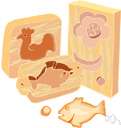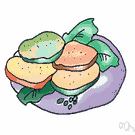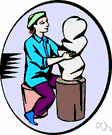mold
Also found in: Thesaurus, Medical, Acronyms, Idioms, Encyclopedia, Wikipedia.
Related to mold: Black mold
mold 1
(mōld)n.
1. A hollow form or matrix for shaping a fluid or plastic substance.
2. A frame or model around or on which something is formed or shaped.
3. Something that is made in or shaped on a mold.
4. The shape or pattern of a mold.
5. General shape or form: the oval mold of her face.
6. Distinctive character or type: a leader in the mold of her predecessors.
7. A fixed or restrictive pattern or form: a method of scientific investigation that broke the mold and led to a new discovery.
8. Architecture See molding.
v. mold·ed, mold·ing, molds
v.tr.
1.
a. To form (something) out of a fluid or plastic material: molded a cup out of clay.
b. To form into a particular shape; give shape to: molded the clay into a ball.
c. To guide or determine the growth or development of; influence: a teacher who helps to mold the minds of his students.
2. To fit closely by following the contours of (the body). Used of clothing.
v.intr.
To assume a certain shape: shoes that gradually molded to my feet.
[Middle English molde, from Old French modle, molle, from Latin modulus, diminutive of modus, measure; see med- in Indo-European roots.]
mold′a·ble adj.
mold′er n.
mold 2
(mōld)n.
1.
a. Any of various filamentous fungi that grow on and contribute to the decay of organic matter.
b. A growth of such fungi.
2. Any of various other saprophytic or parasitic organisms that resemble fungi, such as slime molds or water molds.
intr.v. mold·ed, mold·ing, molds
To become moldy.
[Middle English moulde, probably from past participle of moulen, to grow moldy, from Old Norse mygla.]
mold 3
(mōld)n.
1. Loose friable soil, rich in humus and fit for planting.
2. Chiefly British
a. The earth; the ground.
b. The earth of the grave.
3. Archaic Earth as the substance of the human body.
American Heritage® Dictionary of the English Language, Fifth Edition. Copyright © 2016 by Houghton Mifflin Harcourt Publishing Company. Published by Houghton Mifflin Harcourt Publishing Company. All rights reserved.
mold
(məʊld)n, vb
the US spelling of mould1
Collins English Dictionary – Complete and Unabridged, 12th Edition 2014 © HarperCollins Publishers 1991, 1994, 1998, 2000, 2003, 2006, 2007, 2009, 2011, 2014
mold1
(moʊld)n.
1. a hollow form for giving a particular shape to something in a molten or plastic state.
2. the shape imparted by a mold.
3. something formed in or on a mold: a mold of jelly.
4. a frame on which something is formed or made.
5. shape; form.
6. prototype; precursor.
7. a distinctive nature, character, or type: a person of a simple mold.
8. Archit. a molding.
v.t. 9. to work into a required shape or form; shape.
10. to shape or form in or on a mold.
11. Metall. to form a mold of or from, in order to make a casting.
12. to produce by or as if by shaping material; form.
13. to have influence in determining or forming.
14. to ornament with moldings.
Also, esp. Brit., mould. [1175–1225; < Old French modle < Latin modulus module]
mold′a•ble, adj.
mold′er, n.
mold2
(moʊld)n.
1. a growth of minute fungi forming on vegetable or animal matter, commonly as a downy or furry coating, and associated with decay or dampness.
2. any of the fungi that produce such a growth; mildew.
v.t. 3. to cause to become overgrown with mold.
v.i. 4. to become overgrown with mold.
Also, esp. Brit., mould. [1150–1200; late Middle English mowlde, appar. n. use of variant of earlier mowled, past participle of moulen, mawlen to grow moldy]
mold3
(moʊld)n.
1. loose, friable earth, esp. when rich in organic matter and favorable to the growth of plants.
2. Brit. Dial. ground; earth.
Also, esp. Brit., mould. Random House Kernerman Webster's College Dictionary, © 2010 K Dictionaries Ltd. Copyright 2005, 1997, 1991 by Random House, Inc. All rights reserved.
mold
(mōld) Any of various fungi that often form a fuzzy growth on the surface of organic matter. Some molds cause food to spoil, but others are beneficial, such as those used to make certain cheeses and those from which drugs like penicillin were developed.
The American Heritage® Student Science Dictionary, Second Edition. Copyright © 2014 by Houghton Mifflin Harcourt Publishing Company. Published by Houghton Mifflin Harcourt Publishing Company. All rights reserved.
mold
Past participle: molded
Gerund: molding
| Imperative |
|---|
| mold |
| mold |
Collins English Verb Tables © HarperCollins Publishers 2011
ThesaurusAntonymsRelated WordsSynonymsLegend:
Switch to new thesaurus
| Noun | 1. |  mold - the distinctive form in which a thing is made; "pottery of this cast was found throughout the region" mold - the distinctive form in which a thing is made; "pottery of this cast was found throughout the region"solid - a three-dimensional shape |
| 2. |  mold - container into which liquid is poured to create a given shape when it hardens mold - container into which liquid is poured to create a given shape when it hardenscontainer - any object that can be used to hold things (especially a large metal boxlike object of standardized dimensions that can be loaded from one form of transport to another) form - a mold for setting concrete; "they built elaborate forms for pouring the foundation" matrix - mold used in the production of phonograph records, type, or other relief surface sandbox - mold consisting of a box with sand shaped to mold metal | |
| 3. |  mold - loose soil rich in organic matter mold - loose soil rich in organic matter | |
| 4. | mold - the process of becoming mildewed | |
| 5. |  mold - a fungus that produces a superficial growth on various kinds of damp or decaying organic matter mold - a fungus that produces a superficial growth on various kinds of damp or decaying organic mattermucor - any mold of the genus Mucor rhizopus - any of various rot causing fungi of the genus Rhizopus water mold - parasitic or saprobic organisms living chiefly in fresh water or moist soil fungus - an organism of the kingdom Fungi lacking chlorophyll and feeding on organic matter; ranging from unicellular or multicellular organisms to spore-bearing syncytia | |
| 6. | mold - a dish or dessert that is formed in or on a mold; "a lobster mold"; "a gelatin dessert made in a mold" dish - a particular item of prepared food; "she prepared a special dish for dinner" | |
| 7. | mold - a distinctive nature, character, or type; "a leader in the mold of her predecessors" | |
| 8. |  mold - sculpture produced by molding mold - sculpture produced by molding sculpture - a three-dimensional work of plastic art | |
| Verb | 1. |  mold - form in clay, wax, etc; "model a head with clay" mold - form in clay, wax, etc; "model a head with clay"artistic creation, artistic production, art - the creation of beautiful or significant things; "art does not need to be innovative to be good"; "I was never any good at art"; "he said that architecture is the art of wasting space beautifully" |
| 2. | mold - become moldy; spoil due to humidity; "The furniture molded in the old house" change - undergo a change; become different in essence; losing one's or its original nature; "She changed completely as she grew older"; "The weather changed last night" smut - become affected with smut; "the corn smutted and could not be eaten" dry-rot - affect or be affected with dry rot | |
| 3. |  mold - form by pouring (e.g., wax or hot metal) into a cast or mold; "cast a bronze sculpture" mold - form by pouring (e.g., wax or hot metal) into a cast or mold; "cast a bronze sculpture"shape, mould, mold, form, forge, work - make something, usually for a specific function; "She molded the rice balls carefully"; "Form cylinders from the dough"; "shape a figure"; "Work the metal into a sword" sand cast - pour molten metal into a mold of sand | |
| 4. | mold - make something, usually for a specific function; "She molded the rice balls carefully"; "Form cylinders from the dough"; "shape a figure"; "Work the metal into a sword" carve - form by carving; "Carve a flower from the ice" chip - form by chipping; "They chipped their names in the stone" layer - make or form a layer; "layer the different colored sands" cut out - form and create by cutting out; "Picasso cut out a guitar from a piece of paper" machine - turn, shape, mold, or otherwise finish by machinery grind - shape or form by grinding; "grind lenses for glasses and cameras" stamp - form or cut out with a mold, form, or die; "stamp needles" puddle - subject to puddling or form by puddling; "puddle iron" beat - shape by beating; "beat swords into ploughshares" create from raw material, create from raw stuff - make from scratch preform - form or shape beforehand or determine the shape of beforehand preform - form into a shape resembling the final, desired one mound - form into a rounded elevation; "mound earth" hill - form into a hill roughcast - shape roughly sinter - cause (ores or powdery metals) to become a coherent mass by heating without melting mould, mold, cast - form by pouring (e.g., wax or hot metal) into a cast or mold; "cast a bronze sculpture" throw - make on a potter's wheel; "she threw a beautiful teapot" handbuild, hand-build, coil - make without a potter's wheel; "This famous potter hand-builds all of her vessels" work on, work, process - shape, form, or improve a material; "work stone into tools"; "process iron"; "work the metal" | |
| 5. |  mold - fit tightly, follow the contours of; "The dress molds her beautiful figure" mold - fit tightly, follow the contours of; "The dress molds her beautiful figure" | |
| 6. | mold - shape or influence; give direction to; "experience often determines ability"; "mold public opinion" dispose, incline - make receptive or willing towards an action or attitude or belief; "Their language inclines us to believe them" disincline, indispose - make unwilling miscreate - shape or form or make badly; "Our miscreated fantasies" carry weight - have influence to a specified degree; "Her opinion carries a lot of weight" decide - influence or determine; "The vote in New Hampshire often decides the outcome of the Presidential election" reshape - shape anew or differently; "The new foreign minister reshaped the foreign policy of his country" time - set the speed, duration, or execution of; "we time the process to manufacture our cars very precisely" index - adjust through indexation; "The government indexes wages and prices" pace - regulate or set the pace of; "Pace your efforts" predetermine - determine beforehand |
Based on WordNet 3.0, Farlex clipart collection. © 2003-2012 Princeton University, Farlex Inc.
mold
nounverb
1. To create by forming, combining, or altering materials:
The American Heritage® Roget's Thesaurus. Copyright © 2013, 2014 by Houghton Mifflin Harcourt Publishing Company. Published by Houghton Mifflin Harcourt Publishing Company. All rights reserved.
Translations
formaplíseň
formmug
ŝimo
homesienimuotti
kalupplijesan
penész
mygla
かび型
곰팡이주형
plesenoblikovati
formmögel
แม่พิมพ์รา
khuônmốc
mold
→ عَفَنٌ, قَالِبٌ forma, plíseň form, mug Form, Schimmel καλούπι, μούχλα moho, molde homesieni, muotti moisissure, moule kalup, plijesan forma, muffa カビ, 型 곰팡이, 주형 schimmel, vorm form, mugg odlew, pleśń bolor, mofo, molde плесень, футляр form, mögel แม่พิมพ์, รา kalıp, küf khuôn, mốc 模具, 霉Multilingual Translator © HarperCollins Publishers 2009
mold
n. moho, cualquier moho.
English-Spanish Medical Dictionary © Farlex 2012
mold
n (dent) molde m; (fungus) moho; vt moldearEnglish-Spanish/Spanish-English Medical Dictionary Copyright © 2006 by The McGraw-Hill Companies, Inc. All rights reserved.